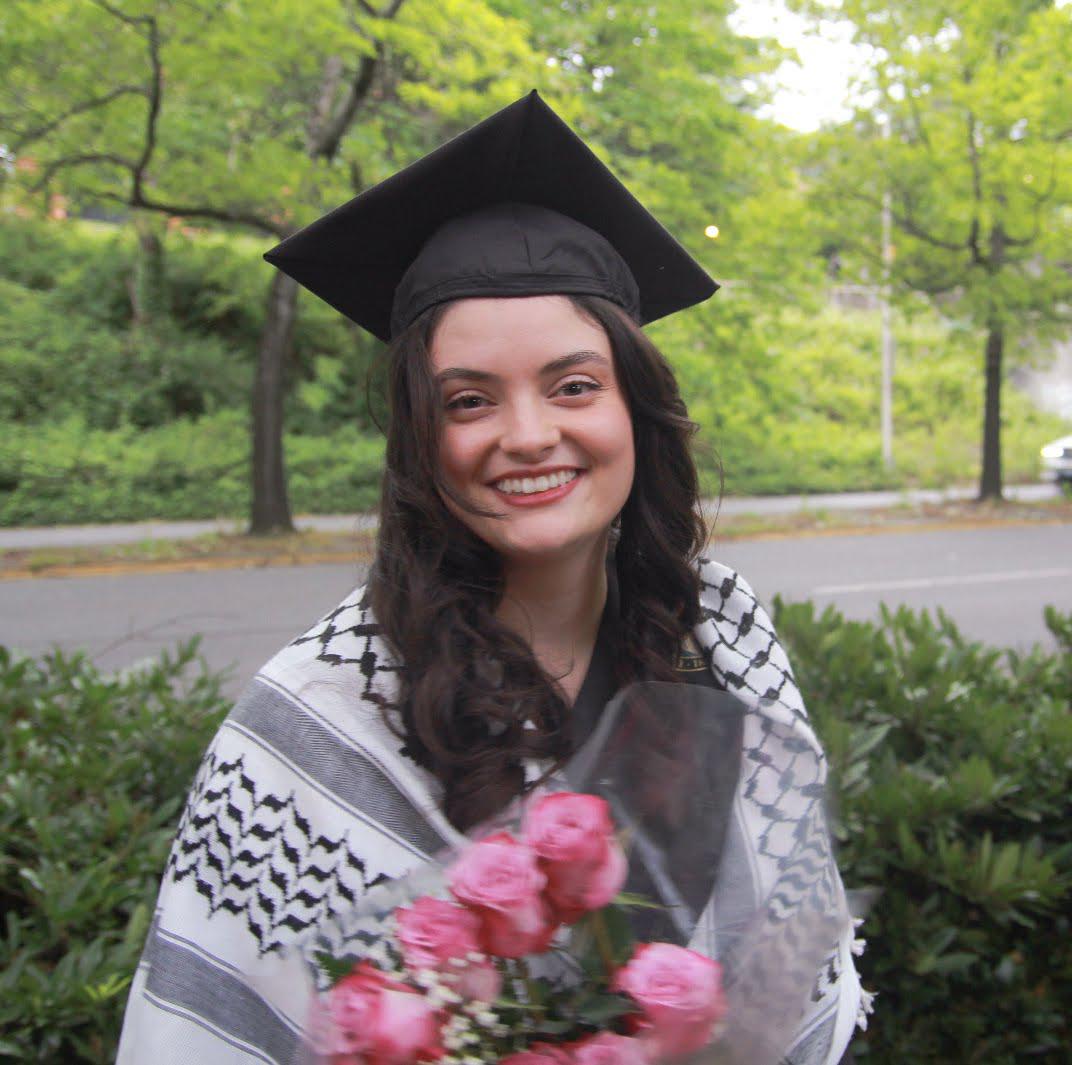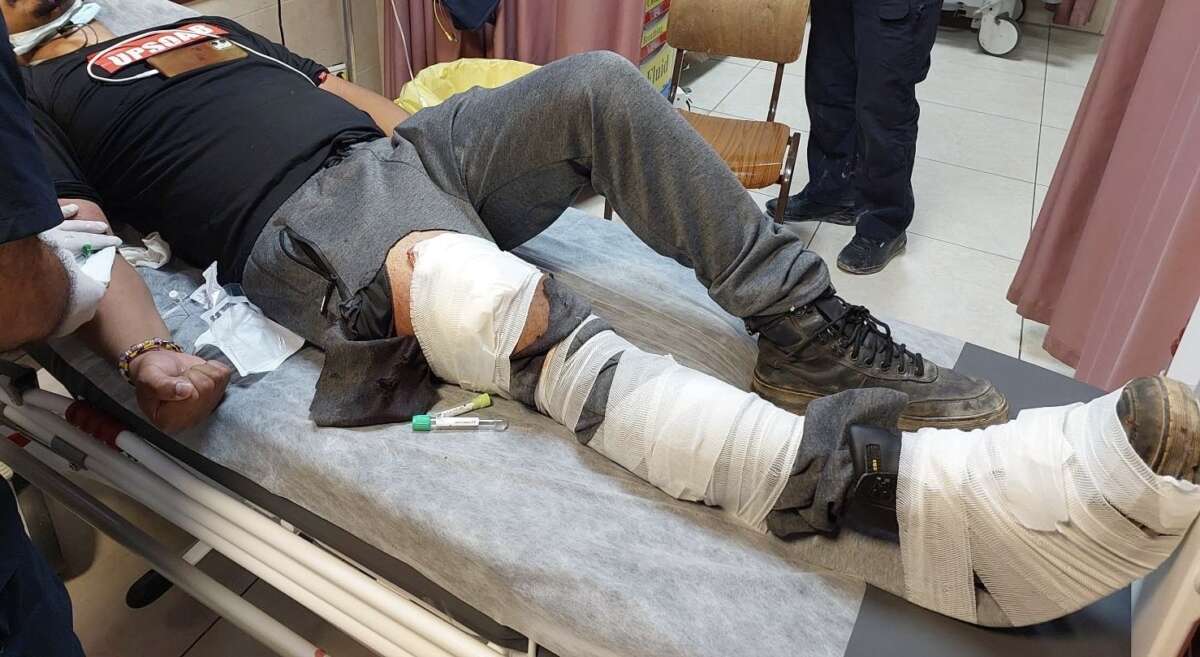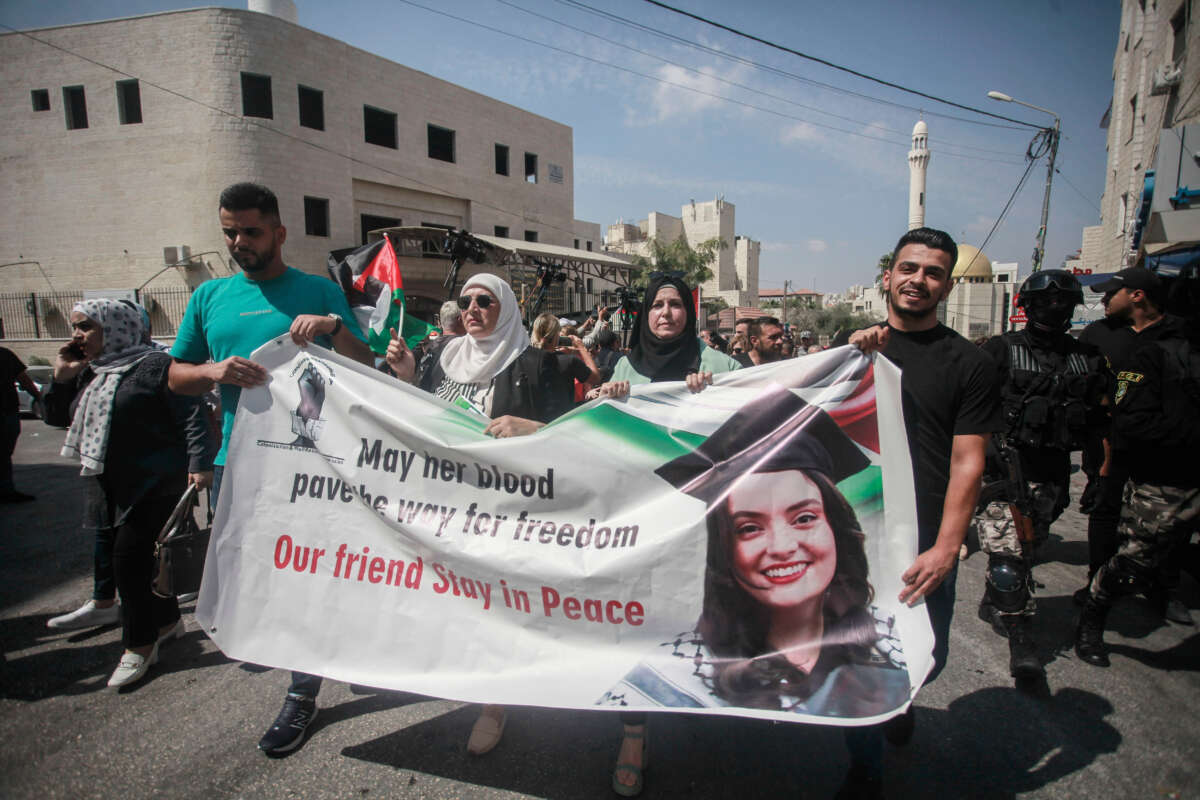Part of the Series
Struggle and Solidarity: Writing Toward Palestinian Liberation
Palestinians from Beita, in the Israeli-occupied West Bank, have been gathering every week since October for demonstrations against the ongoing Israeli genocide in the Gaza Strip and Israeli occupation of Palestine more broadly. The villagers gather to pray, then march to the Israeli soldiers stationed at a nearby Israeli settlement — one of 300 throughout the West Bank, which the International Court of Justice has deemed illegal, yet the Israeli government persists in expanding. The villagers of Beita gather, pray, march and chant to demonstrate their opposition to the nearby settlement, as well as their resolve to lose no more of their land to settlers.
At one of the weekly protests this month, the villagers were accompanied by volunteer observers from the United States, including Vivi Chen and Aysenur Eygi. Both the villagers and the observers at the September 6 gathering soon came under fire from Israeli soldiers, as Chen described to Truthout. Villagers and observers alike were driven back by a combination of live ammunition and tear gas, forced to take cover downhill from the soldiers, where it was quiet enough for them to make out the first shot of an Israeli sniper, which struck a dumpster shielding a villager. Chen was unsure if one or two shots followed, but Eygi, who was behind an olive tree, suddenly fell, after a bullet struck her in the head.
“It was a headshot to kill,” said Chen. “All the Palestinian medics who were on site, as well as me and another volunteer, went to her. We were able to feel a weak pulse in both her wrist and her neck, but … her eyes were rolling in the back of her head. She pretty much collapsed unconscious immediately.”
Palestinian paramedics rushed Eygi to a hospital in nearby Nablus, but she could not be resuscitated. Like Chen and other U.S. observers, Eygi had come to the West Bank as part of a movement in solidarity with Palestinians resisting the ongoing Israeli-inflicted genocide and occupation. She had arrived in the West Bank just days before she was killed, underscoring the danger to life and limb that the Israeli occupation presents to Palestinians and their allies alike.

“Settlers and the Occupation Army Do Not Care About Any Nationality”
Since the attack by Palestinian militants on Israel in October, Israeli forces have killed more than 41,000 Palestinians, including 16,500 children, according to the Palestinian Ministry of Health, as cited by Al Jazeera. The true toll of the genocide, obscured by the ongoing Israeli attacks and blockade, may be as high as 335,500 deaths, according to estimates published in The Guardian. The genocide comes amid the ongoing Israeli occupation of Gaza, East Jerusalem and the West Bank since 1967, even though they are internationally recognized as Palestinian territory. Israel has entrenched its occupation by allowing the construction of illegal settlements in the West Bank.
Eygi was in the West Bank with the Palestinian-led International Solidarity Movement, which facilitates foreign volunteers’ participation in Palestinian demonstrations and direct actions. Movement members also accompany, and document crimes against, Palestinian farmers working their fields and children traveling to and from schools, who are at increased risk of attack by Israeli soldiers and settlers hoping to drive them out of the area.
Chen belongs to a similar organization, Faz3a — pronounced “faz’a,” or “reinforcement” in Arabic — which collaborates with the International Solidarity Movement toward the same goals. Abdul Hakim Wadi, a supervisor with Faz3a, describes the impact that volunteers like Eygi and Chen have as being both material and sentimental: They use their status as international observers to curb the violence that Israeli soldiers and settlers inflict upon Palestinians, while also demonstrating that the Palestinian struggle has resonance around the world.
“They are peaceful people,” Wadi told Truthout, referring to the observers. However, he warned: “The settlers and the occupation army do not care about any nationality, nor do they care about international law.”
“No politicians reached out to me or even stood up and said, ‘Wow, a U.S. citizen was shot — let’s look at this and hold them accountable.’”
While the casualties of the ongoing Israeli genocide are concentrated in Gaza, Israeli soldiers and settlers have also used the genocide as cover for increasing violence in the West Bank, where more than 700 Palestinians, including 160 children, have been killed since October 7, according to figures from the Palestinian Ministry of Health. In Beita alone, the International Solidarity Movement reports at least four Palestinians have been killed by Israeli soldiers or settlers since the start of the genocide. At least two Palestinian Americans have also been killed in the West Bank since October: Tawfic Abdel Jabbar and Mohammad Khdour, both teenagers apparently killed by Israeli soldiers or settlers in separate though similar incidents, as reported by The Associated Press and others.
Violence from Israeli soldiers and settlers toward U.S. observers long predates Eygi’s killing. In July, Chen and other observers with Faz3a were accompanying Palestinian farmers in Qusra, who often face Israeli settlers aiming to deprive them of their livelihoods. The group was attacked by masked settlers armed with clubs, severely injuring several farmers and observers. Then, in August, hundreds of masked settlers stormed Qusra, as reported by the United Nations and others. The settlers attempted to raze the village to the ground, according to Chen, who was struck in the head with a stone, while another Faz3a volunteer was hit with a flare. Although stone-throwing by Palestinians is frequently cited by Israeli soldiers as justification for responding with live ammunition, Chen accused the soldiers at the scene of ignoring the attacks by settlers, intervening only to threaten the villagers and observers with arrest.
On August 9, another U.S. observer with Faz3a, Daniel Santiago, was shot by Israeli soldiers in Beita, where Eygi was later killed. Like Eygi, Santiago was attending the weekly demonstration by Palestinians against the Israeli genocide and occupation, which he described to Truthout.
“Right after the Jummah [Friday] prayer, when folks started chanting, we already saw them to our right in a watchtower,” said Santiago, referring to the Israeli soldiers. “They were already pointing guns at us from the beginning.”
When Israeli soldiers began firing live ammunition and tear gas, the villagers and observers retreated behind a nearby concrete wall, which the soldiers continued to target. Then, as Santiago attempted to retreat further, through an olive grove, he was struck in the back of his right thigh.
“I was making sure that folks around me were safe, so I let them go in front of me,” said Santiago. “And as I was running as well, going down the embankment in the olive grove, that’s when I was shot.”
Doctors at the hospital in Nablus were able to stitch up Santiago’s wound, which they told him was caused by a round from an M16 assault rifle. As reported by Axios and others, the rifles are manufactured in the United States and their sale to Israel is contingent upon the approval of the U.S. government.

“They Will Continue to Come to Palestine”
In a sense, such violence by Israeli soldiers and settlers against U.S. observers undermines the working models of organizations such as the International Solidarity Movement and Faz3a. Although volunteers arrive in the West Bank aware that they may be subjected to the same violence that soldiers and settlers unleash on Palestinians, their status as international observers — that is, foreign nationals whose governments would ostensibly object to them being harmed by Israeli soldiers or settlers — is meant to protect both them and the Palestinians whom they accompany. And while Wadi of Faz3a explained that violence from Israeli soldiers and settlers is usually tempered by the presence of observers, he and other Palestinians are dismayed at the impunity the Israeli government continues to enjoy even when its military kills foreign nationals.
“Palestinians expected that the governments of the world would move and do something about the attacks that are happening against foreign activists,” he explained. “But they discovered that the governments of the world are hypocrites and do not stand against the crimes of the occupying state.… They expected that there would be immunity for foreign activists, especially those who hold American citizenship.”
In all of the aforementioned cases — those of Santiago, Eygi, Jabbar and Khdour — the involvement of the U.S. government has started, and thus far ended, with requests for the Israeli government to investigate its own soldiers and settlers. For its part, the Israeli government has yet to hold anyone accountable in any of the cases.
“The presence of more foreign supporters, and the continuous presence of local and international media, helps in documenting the crimes of the settlers and the occupation army.”
Santiago’s case is representative of the U.S. government’s nonresponse to its citizens being attacked by Israeli soldiers and settlers, as well as the Israeli government’s unaccountability. Santiago himself heard nothing from the Israeli government, which publicly claimed that he had been accidentally struck by a warning shot fired into the air by an Israeli soldier — an excuse which Santiago categorically rejects, as he was hit from the side, rather than above. The U.S. Embassy contacted him to take a report of the incident, but if anything came of it, he has yet to hear it. While Santiago isn’t hoping to garner attention for himself, he feels the silence of the U.S. government in his case contributed to the killing of Eygi the following month.
“No politicians reached out to me or even stood up and said, ‘Wow, a U.S. citizen was shot — let’s look at this and hold them accountable,’” said Santiago. “It led Israeli forces, in their impunity, to shoot another U.S. citizen, and this time straight in the head.”
Despite acknowledging the growing challenges, U.S. observers remain committed to their work in the West Bank. Even after being shot, Santiago remained in the West Bank for the entire duration of his planned stay and hopes to return as soon as next summer. Even after witnessing Egyi’s killing, and surviving multiple attacks by Israeli soldiers and settlers herself, Chen is also staying for the planned duration of her trip. Dismayed as he may be, Wadi too remains committed to bringing international observers to the West Bank.
“The presence of more foreign supporters, and the continuous presence of local and international media, helps in documenting the crimes of the settlers and the occupation army,” he said. He described the ongoing work of international observers as “a message to the occupation state, that their attacks will not intimidate foreign supporters and that they will continue to come to Palestine.”
Trump is busy getting ready for Day One of his presidency – but so is Truthout.
Trump has made it no secret that he is planning a demolition-style attack on both specific communities and democracy as a whole, beginning on his first day in office. With over 25 executive orders and directives queued up for January 20, he’s promised to “launch the largest deportation program in American history,” roll back anti-discrimination protections for transgender students, and implement a “drill, drill, drill” approach to ramp up oil and gas extraction.
Organizations like Truthout are also being threatened by legislation like HR 9495, the “nonprofit killer bill” that would allow the Treasury Secretary to declare any nonprofit a “terrorist-supporting organization” and strip its tax-exempt status without due process. Progressive media like Truthout that has courageously focused on reporting on Israel’s genocide in Gaza are in the bill’s crosshairs.
As journalists, we have a responsibility to look at hard realities and communicate them to you. We hope that you, like us, can use this information to prepare for what’s to come.
And if you feel uncertain about what to do in the face of a second Trump administration, we invite you to be an indispensable part of Truthout’s preparations.
In addition to covering the widespread onslaught of draconian policy, we’re shoring up our resources for what might come next for progressive media: bad-faith lawsuits from far-right ghouls, legislation that seeks to strip us of our ability to receive tax-deductible donations, and further throttling of our reach on social media platforms owned by Trump’s sycophants.
We’re preparing right now for Trump’s Day One: building a brave coalition of movement media; reaching out to the activists, academics, and thinkers we trust to shine a light on the inner workings of authoritarianism; and planning to use journalism as a tool to equip movements to protect the people, lands, and principles most vulnerable to Trump’s destruction.
We urgently need your help to prepare. As you know, our December fundraiser is our most important of the year and will determine the scale of work we’ll be able to do in 2025. We’ve set two goals: to raise $150,000 in one-time donations and to add 1,500 new monthly donors.
Today, we’re asking all of our readers to start a monthly donation or make a one-time donation – as a commitment to stand with us on day one of Trump’s presidency, and every day after that, as we produce journalism that combats authoritarianism, censorship, injustice, and misinformation. You’re an essential part of our future – please join the movement by making a tax-deductible donation today.
If you have the means to make a substantial gift, please dig deep during this critical time!
With gratitude and resolve,
Maya, Negin, Saima, and Ziggy
